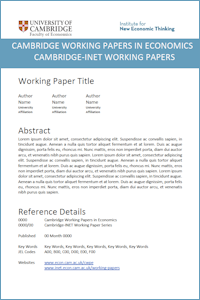
Corsetti, G., Kuester, K. and Müller, G. J.
Fixed on Flexible Rethinking Exchange Rate Regimes after the Great Recession
CWPE1729
Abstract: The zero lower bound problem during the Great Recession has exposed the limits of monetary autonomy, prompting a re-evaluation of the relative benefits of currency pegs and monetary unions (see e.g. Cook and Devereux, 2016). We revisit this issue from the perspective of a small open economy. While a peg can be beneficial when the recession originates domestically, we show that a float dominates in the face of deflationary demand shocks abroad. When the rest of the world is in a liquidity trap, the domestic currency depreciates in nominal and real terms even in the absence of domestic monetary stimulus (if domestic rates are also at the zero lower bound) - enhancing the country's competitiveness and insulating to some extent the domestic economy from foreign deflationary pressure.
Keywords: External shock, Great Recession, Exchange rate, Zero lower bound, Exchange rate peg, Currency union, Fiscal Multiplier, Benign coincidence
JEL Codes: F41 F42 E31
Author links: Giancarlo Corsetti
PDF: https://www.econ.cam.ac.uk/research-files/repec/cam/pdf/cwpe1729.pdf 
Open Access Link: https://doi.org/10.17863/CAM.39165
Published Version of Paper: Fixed on Flexible Rethinking Exchange Rate Regimes after the Great Recession, Corsetti, G., Kuester, K. and Müller, G. J., IMF Economic Review (2017)
<< CWPE Home | CWPE List 2017 >>
